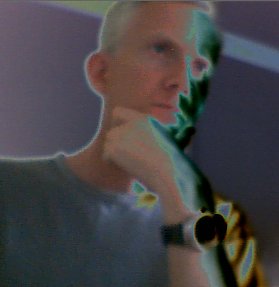Nick Perry's new play The Loop is a charming sci fi piece that sneaks some surprisingly emotional lumps of hard matter into what seems a whimsical tale.
"Nick Perry" is a writer trying to write a radio play - but don't let that put you off. Nick is the first person to moan about how middle-aged writers start writing about writing. (He also says, "I can't get into science fiction... It's all a load of crap, really".) When his four year old son plays with Nick's mobile phone, Nick finds himself speaking to one Jim Giller - a writer on The Twilight Zone. In 1959.
This mashup between the Afternoon Play and the (original) Twilight Zone is an affectionate tribute to both institutions, but it's also a respectable drama with some neat jokes. Perry (the Perry behind "Nick Perry", as it were) lulls us into a comfortable sense that we're just cosily exploring that good old conundrum of science fiction, the loopy nature of interfered-with time. However, I did get seduced enough to go and look "Jim Giller" up on Wikipedia at the same time as Nick did. (Well, I think it was the same time.)
We know there's going to be a twist in the story because we're told it has to have one, but it still comes as a satisfying surprise. The final tying off of the loop is also very tidily done. Is the story real, or not? Well, that's what happens on The Twilight Zone and, this time, on the Afternoon Play.
In passing, it's worth mentioning that this is one of the few radio plays I've heard with a convincing small child in it. And was that a bit of Calexico on the playout music?
Finally, anyone who's found their own temporal trajectory coinciding with that of the BBC Radio Drama commissioning cycle will appreciate Nick's cry of "who knows how their minds work?" But I'm sure that anyone who's got through to the other side will also agree with Nick that radio is... "the theatre of being paid bugger-all". (Just kidding.) (A bit.)
Nick Perry ...... Ivan Kaye
Jim Giller ...... Edward Hogg
Old Man ...... Peter Marinker
Policeman ...... Rhys Jennings
Dolores ...... Emerald O'Hanrahan
Woman ...... Melissa Advani
Directed by Toby Swift and broadcast on Wednesday 18 November 2009 at 14:15 on BBC Radio 4. Available on BBC iPlayer until 25 November 2009.
